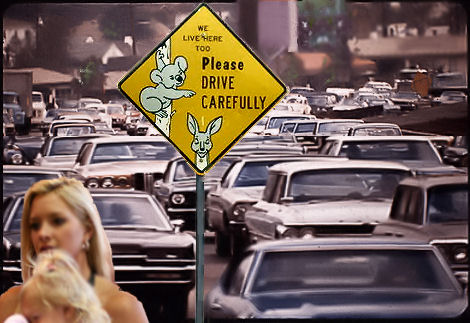Rudd's new Population Ministry

Wayne Swann obfuscates
According to recent reports Wayne Swan ..."can't bring (him)self to agree with those who think we can solve all our problems by putting a freeze on national
population growth”. No Wayne, we certainly can't solve all our problems by reducing runaway population growth, but it sure would go a long way toward easing house prices, shortening hospital queues, preserving the environment and cutting our carbon footprints.
Who is this ‘We’?
A great many Australians these days would really like to know who exactly Mr Swan is referring to when he talks about "we" solving “our” problems. Is it the "working families" struggling in the outer suburbs to pay off hefty mortgages on second-rate housing stock on the fringes of our cities - or is it the vested corporate interests at the big end of town which possess an insatiable appetite for more growth, more markets and more people? Whose problems are you trying to solve Mr Swan?
Political addiction to population growth
The gap between the policies of the Liberal/Labor (Liboral?) party elites - that are politically addicted to massive population growth and mass-immigration - and the wishes of the electorate has never been greater. It’s a bipartisan problem. Tony Abbott has been whipping up mass hysteria about boat people lately, trying to make it an election issue. He's going to "close the borders" screamed the Herald Sun last week. But on the broader topic of mass-immigration, like the P.M. and Wayne Swan, Mr Abbot has also nailed his colours to the mast as a "big Australia" man whose "instinct" is to bring in "as many people as possible".
Who benefits and who loses by population growth?
Cheerleaders for the growthist lobby in the media have been doing their level best to scare the bejesus out of the public by raving on about retiring baby boomers and even raising the prospect of an armed invasion should we dare to consider putting the brakes on. The problem is no-one seems to have any real insight into where all this growth is heading for our country as well as the thorny question of who benefits and who loses from it? Who gets the profits and who gets to pay? How does the average citizen benefit when GDP per capita declines through massive population growth? Exactly what are the long-term implications for the environment and the famed liveability of our cities of this new "mega-trend"?

Rudd like a deer caught in headlights on population numbers
Despite the creation of a new population ministry, Labor has not had a great deal to say on these questions so far other than "growth is good". Mr Rudd hasn't even had an opinion this year. He appeared like a deer caught in the headlights recently when Kerry O’Brien confronted him on the 7:30 report - which is a bit strange considering that he "made no apology" last year for his support for “a big Australia”.
These questions are being ignored by our leaders other than a very vague undertaking to perhaps grow somewhat “differently" than before - presumably by stacking people 50 stories up in ugly high rises or transforming our urban areas into Los Angeles-style megalopolises with double-decker freeways and ghettoes of haves (those who bought houses before the great population explosion) and the less-fortunate have-nots that didn’t.
Some commentators in the media are suggesting that Rudd has "gone cold" on a big Australia this year. But what is far more likely is that he is simply being a very clever politician – like his predecessor John Howard - and is saying nothing publicly. Behind closed doors, however, he and his minions are champing at the bit to raise the volume as high as they can get way with without provoking too great a backlash from so-called working families whose marginal seats Labor took back from “Howard’s battlers” at the last election.

Expect Spin
To keep population growth ticking along at 2.1% per annum and maintaining a docile and electorate Rudd will try to do what politicians do best - bombard us with a mountain of meaningless words on things like the "programmatic specificity" of his new population ministry - but without of course actually doing anything.
One thing is certain, if the present growth trajectory is going to be maintained by Canberra indefinitely, the volume of complaints rising from the public is going to grow incredibly loud. When it takes the average person more than a lifetime to pay off a mortgage on an average house and when commuters have to spend half their lives stuck on clogged freeways or dysfunctional public transport systems, the politicians that continue to push growthist polices are going to eventually pay a heavy price at the ballot box.
Stable Population Party of Australia - a new alternative
Let's hope the newly formed Stable Population Party of Australia can capture many of the votes of the people that are most badly impacted by our government’s mad growth-at–all-costs agenda. We desperately need to lobby and apply pressure on our elected leaders to change their current policies. This is going to require constant media campaigns to get the public's attention as well as a small army of committed activists to get the message out.
Growth Lobby vs The People
The public needs to be made aware that there is an alternative to growth for growth's sake and that there is an alternative to the "Liboral Party” and their bipartisan and undemocratic policies which are failing to maintain a sustainable population. Make no mistake; the growth lobby is a formidable opponent with enormous financial resources on its side as well as the backing of both major parties and large sectors of the media. Only a very vigorous and determined grass-roots campaign the likes of which we haven’t seen before in Australia is going to have any chance at success at slowing down this juggernaut.
NOTES
7 April title was changed to better reflect newsworthy content


Recent comments